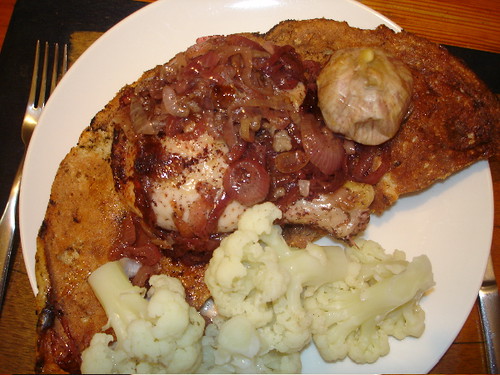I guess I am on a spice kick right now, but then spices are the key ingredient in Middle Eastern food. I bought some sumac a while ago and have been meaning to make something with it and today is the day.
Sumac has a sour and vaguely lemony taste and grows wild in the Mediterranean and in much of the Middle East. It is a popular condiment in Turkey and Iran, where it’s liberally sprinkled on kebabs and rice, or mixed with onions as an appetizer or salad. The Palestinians, Lebanese, Syrians and Egyptians add water and other spices to sumac to form a paste, and add it to meat, chicken and vegetable dishes. I only recently learned that sumac is related to poison ivy.
I decided to make a popular Palestinian dish, called Musakhan (which means ‘something that is heated’), that is typically made in a taboun oven, but I will have to make due with my regular oven. My dream is to have an outdoor wood-fired oven someday so I can do some real slow cooking and baking.
As with all Middle Eastern dishes, there are numerous variations of this dish. Some are only with sumac, others with sumac and a combination of several different spices. I have chosen to make the dish with sumac, allspice, nutmeg and cinnamon.
Because the dish is cooked on top of flat bread, it is typically eaten with your hands, using the bread as a base to pick up the moist chicken and sauteed onions.
I got the flat bread above, called Saluf, at a Yemenite bakery around the corner from my house. They sell this flat bread that they made right in front of my eyes and they also sell Yemenite Shabbat bread called Kubaneh. It was very tempting to tear off some of the hot bread, but I behaved myself.
The dish was delicious. My husband I thought that I could have added a couple more tablespoons of sumac and next time I will cover the dish with foil before I put it in the oven. The bread was a little too crunchy on the top.
We did taste all of the spices and they gave off such a wonderful perfume in the house. I forgot about the pine nuts. Oh well.
This dish was even better the next day and the bread on the bottom was very soft and was infused with all of the juices and flavour from the chicken and spices. I am definitely making this again.
- 1 1 1/2kg or 3lb frying chicken, quartered
- 2 tablespoons ground sumac
- 1/2 teaspoon ground nutmeg
- 1/2 teaspoon ground allspice
- 1/2 teaspoon ground cinnamon
- 1/4 tsp. freshly ground black pepper
- Sea salt optional for kosher chicken
- Juice of 1 lemon
- 1 kg 2lbs red onions, peeled and thinly sliced
- Olive oil
- 2 large Saluf Yemenite flat bread, Lafa (Iraqi flat bread), khubz 'arabi (Arabic flat bread) or 1/4 kg (1/2 lb) of pita, split in half
- 1/4 cup pine nuts toasted
- 2 heads of garlic roasted
-
Rinse the chicken and pat dry. Trim off excess fat.
-
Combine the sumac, spices, salt and pepper. Set aside 2 teaspoons and mix the rest with the lemon juice. Rub into the chicken and marinate up to 1 day.
-
Place the onions in a large skillet, toss with 3 tablespoons of the olive oil, reserved spices, and a pinch of salt. Cover and cook gently 30 minutes. Set aside in a bowl. (Up to this point, the dish can be prepared 1 day in advance.)
-
Bring the chicken to room temperature and preheat the oven to 180C (350F). In the same skillet as used for the onions, heat 2 tablespoons olive oil, then lightly brown the chicken on all sides over a medium heat. Remove and set aside.
-
Cover a baking dish with two overlapping halves of the flat bread or several pita halves. Spoon half the onions over each, then arrange the chicken on top of the onions and cover with the remaining onions and the juices from the skillet.
-
Cover with the two remaining half leaves of flat bread or pita, tucking in the sides, crusty side up, and spray with water. Bake until the chicken is very tender and almost falling off the bone, approximately 1-1/ 2 hours. Check the chicken occasionally and cover the baking dish with aluminum foil before the top cover of the flat bread begins to burn.
-
Serve at once with a sprinkling of the pine nuts and roasted garlic.






That looks delicious! I find that sumac is a very interesting spice…
Fabulous. I’m going to make this dish right away! I used to keep sumac around the kitchen, but had forgotten about it. It lends a tempting color, and the lemony taste of it goes well with so many savory foods. Thanks for reminding me.
Miriam
You haven’t heard of “poison sumac”?
Hi Carol,
Yes, I have heard of poison sumac, but it never occurred to me that the two were related.
Poison sumac doesn’t grow here in the Middle East. The sumac used as a spice here is Rhus coriaria. The berry cluster grows on tall trees. It is thought to have anti-oxidant properties. And it tastes good.
Poison sumac is Toxicodendron vernix or Rhus vernix is native to the New World and is a shrub rather than a tree. In the States grows staghorn sumac, which is edible and can be used to make a lemonade-like drink.
Miriam